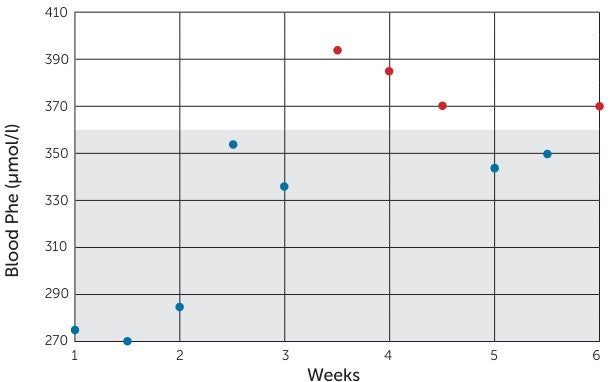
PKU sphere™: Use in Pre-conception | Case Study
Description
This case study highlights the use of PKU sphere™ as a protein substitute during preconception for a patient with Hyperphenylalaninemia.
Notes:
PKU sphere20 and PKU air20 are Foods for Special Medical Purposes
Hyperphenylalaninemia is a disorder of Phenylalanine (Phe) metabolism. It is an autosomal recessive inherited condition and its presentation can range from mild to severe. It is caused by a deficiency in the enzyme Phenylalanine Hydroxylase (PAH). This limits Phe conversion to Tyrosine (Tyr) in the body. The accumulation leads to high Phe concentrations which are neurotoxic especially to the brain. Usually people with mild hyperphenylalaninemia on a normal diet have a blood Phe concentration of 120-600µmol/l, therefore there is a low risk of neurological impairment.
Some milder patients can continue with a normal diet, however if they wish to have children they need to adopt a low protein diet to prevent maternal PKU syndrome. The recommended Phe range for maternal PKU is 120-360µmol/l1 . Therefore, reducing dietary protein and introducing additional protein substitutes free of Phe is required in these patients.
Phe and Tyr levels are closely monitored and the diet adjusted accordingly. This will ensure that the foetus doesn’t suffer from the teratogenic effects of high Phe levels such as developmental delay, microcephaly, cardiac defects and low birth weight1 .
Age: 28
Gender: Female
Diagnosis: Variant hyperphenylalaninemia diagnosed via newborn screening, Phe 450µmol/l at 5 days old.
Relevant Medical history
Usual blood Phe between 200 – 700µmol/l. Previous conception 5 years ago but this sadly ended in miscarriage. Keen to start a family and referred to our metabolic service via her GP.
Dietetic assessment
Adhered to a low protein diet from age 4-14 years, Phe levels were between 370-680µmol/l.
5 years ago she followed a preconception diet which involved removing High Biological Value (HBV) protein and starting protein substitutes, this provided an additional 40g of protein equivalent (PE). Since stopping her low protein diet Phe levels have been 370-680µmol/l.
Height: 1.73m Weight: 84.6kg BMI: 28.3kg/m2
Current intake: Normal diet with no protein substitutes. Protein intake estimated at 80g per day including HBV sources.
To achieve consistent phe levels between 120-360µmol/l.
Tried samples of amino acid (AA) and glycomacropeptide (GMP) based protein substitutes and chose to take PKU sphere20 (GMP-based) o.d and PKU air20 (AA-based) o.d to provide 40g PE per day.
PKU sphere20 and PKU air20 were introduced immediately. The Vitaflo guidelines for introducing GMP for patients in a relaxed non-adherent diet were consulted2 . She was also advised to reduce intake of HBV protein to 30g per day; which involved reducing her portions of dairy foods and removing meat/fish and poultry from her diet. Phe levels and tolerance were closely monitored. Twice weekly blood spots for Phe levels were taken while on the preconception diet.
She also commenced on a pre-pregnancy multivitamin and mineral which contained 5mcg Vitamin D, 400µg folic acid and 14mg Iron.
Phenylalanine levels:
Baseline Phe levels prior to starting preconception diet were 496umol/l. Despite PKU sphere20 containing 36mg of Phe, within 1 week of commencing the preconception diet alongside both protein substitutes, Phe levels improved to be consistently within the recommended range up until the period shown on the graph below.

Key:
🔴 - out of recommended blood Phe range
🔵 - within recommended blood Phe range
The graph shows twice weekly Phe levels 6 weeks prior to conception, when on several occasions Phe was high due to eating HBV foods at Christmas parties and takeaways. She had also started a new job with a long commute, reducing time to prepare suitable low protein meals. Both GMP and AA based protein substitutes were tolerated with no problems.
PKU sphere20 was well tolerated on the preconception diet. She liked the taste and found it easy to prepare. PKU sphere20 was introduced quickly and Phe levels remained within recommended range, despite PKU sphere20 containing 36mg of Phe per sachet.
No gastrointestinal side effects were reported. She became pregnant 4 months after commencing the preconception diet and continues PKU sphere20 o.d and PKU air20 o.d, with regular reviews planned for throughout the pregnancy.
PKU sphere is suitable to use as part of the preconception diet in patients with hyperphenylalaninemia.
- Van Spronsen FJ, van Wegberg AM, Ahring K, Bélanger-Quintana A, Blau N, Bosch AM, et al. Key European guidelines for the diagnosis and management of patients with phenylketonuria. The Lancet Diabetes & Endocrinology. 2017.
- Vitaflo dietitians in collaboration with Macdonald A and Daly A The introduction and use of PKU Sphere, a glycomacropeptide (GMP) based product in children and adults with PKU 2017.
